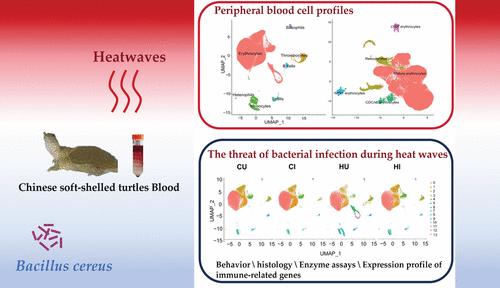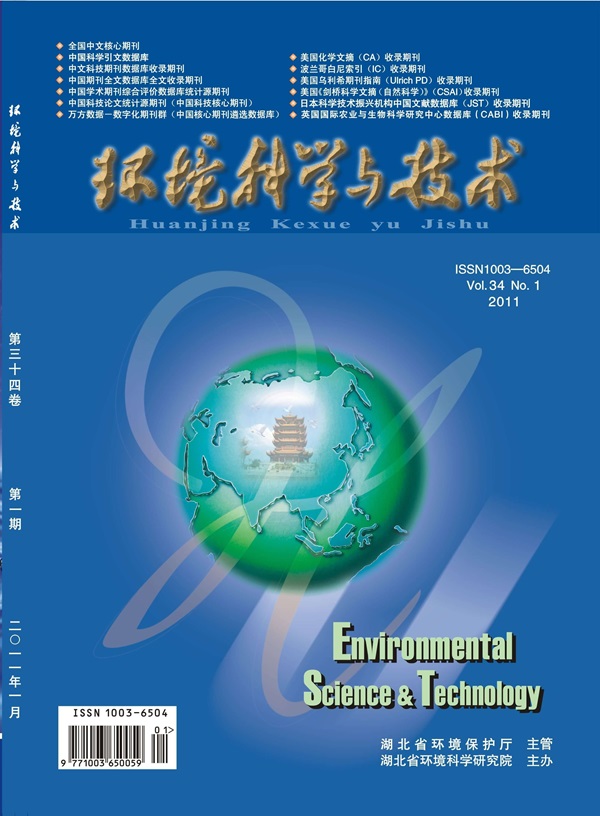高温环境下细菌感染对华鳖单细胞转录组的影响
IF 11.3
1区 环境科学与生态学
Q1 ENGINEERING, ENVIRONMENTAL
引用次数: 0
摘要
全球变暖的加剧可能加速机会性病原体的广泛传播,对野生动物种群施加双向压力,并可能加速物种灭绝的过程。本研究综合了华鳖外周血单细胞转录组、行为和生理指标,探讨了细菌感染和/或热浪双重应激对华鳖的影响。根据28℃恒温和热浪暴露情况,以及是否感染细菌(蜡样芽孢杆菌),将海龟随机分为4组。基于主成分分析的细胞聚类显示,14个细胞簇可分为7种不同的细胞类型:红细胞、单核细胞、血小板、T细胞、B细胞、嗜碱性细胞和嗜中性细胞。所有细胞类型都参与宿主对热浪和细菌感染的免疫反应,但这些细胞在基因表达模式上表现出显著的群体特异性差异。细菌感染和热浪改变了海龟的行为和生理指标。双重胁迫抑制了抗氧化酶和免疫基因的表达,可能危及海龟的生存。综上所述,本研究对不同环境条件下中华鳖外周血细胞谱的研究提供了有价值的见解,增强了对其免疫反应和潜在应激源的理解。本文章由计算机程序翻译,如有差异,请以英文原文为准。

Effects of Bacterial Infections under Heatwaves on Chinese Soft-Shelled Turtles and Their Single-Cell Transcriptomic Landscapes
The intensification of global warming could precipitate the widespread dissemination of opportunistic pathogens, exerting a bidirectional strain on wildlife populations and potentially hastening the process of species extinction. In this study, we integrated indicators from peripheral blood single-cell transcriptome, behavior, and physiological indices in Chinese soft-shelled turtles (Pelodiscus sinensis) to explore the impact of dual stress caused by bacterial infections and/or heatwaves on the turtles. Turtles were randomly divided into four groups based on constant temperature at 28 °C and heatwave exposure, as well as whether they were infected with bacteria (Bacillus cereus). Principal component analysis-based cell clustering revealed that the 14 cell clusters were classified into seven distinct cell types: erythrocytes, monocytes, thrombocytes, T cells, B cells, basophils, and heterophils. All cell types participated in the host immune response to heatwaves and bacterial infection, but these cells exhibited significant group-specific differences in their gene expression patterns. Bacterial infections and heatwaves altered turtle behavior and physiology indexes. The dual stresses inhibited the expression of antioxidant enzymes and immune genes, potentially jeopardizing turtle survival. Overall, this study provides valuable insights into peripheral blood cell profiles of Chinese soft-shelled turtles under different environmental conditions, enhancing the understanding of their immune responses and potential stressors.
求助全文
通过发布文献求助,成功后即可免费获取论文全文。
去求助
来源期刊

环境科学与技术
环境科学-工程:环境
CiteScore
17.50
自引率
9.60%
发文量
12359
审稿时长
2.8 months
期刊介绍:
Environmental Science & Technology (ES&T) is a co-sponsored academic and technical magazine by the Hubei Provincial Environmental Protection Bureau and the Hubei Provincial Academy of Environmental Sciences.
Environmental Science & Technology (ES&T) holds the status of Chinese core journals, scientific papers source journals of China, Chinese Science Citation Database source journals, and Chinese Academic Journal Comprehensive Evaluation Database source journals. This publication focuses on the academic field of environmental protection, featuring articles related to environmental protection and technical advancements.
 求助内容:
求助内容: 应助结果提醒方式:
应助结果提醒方式:


